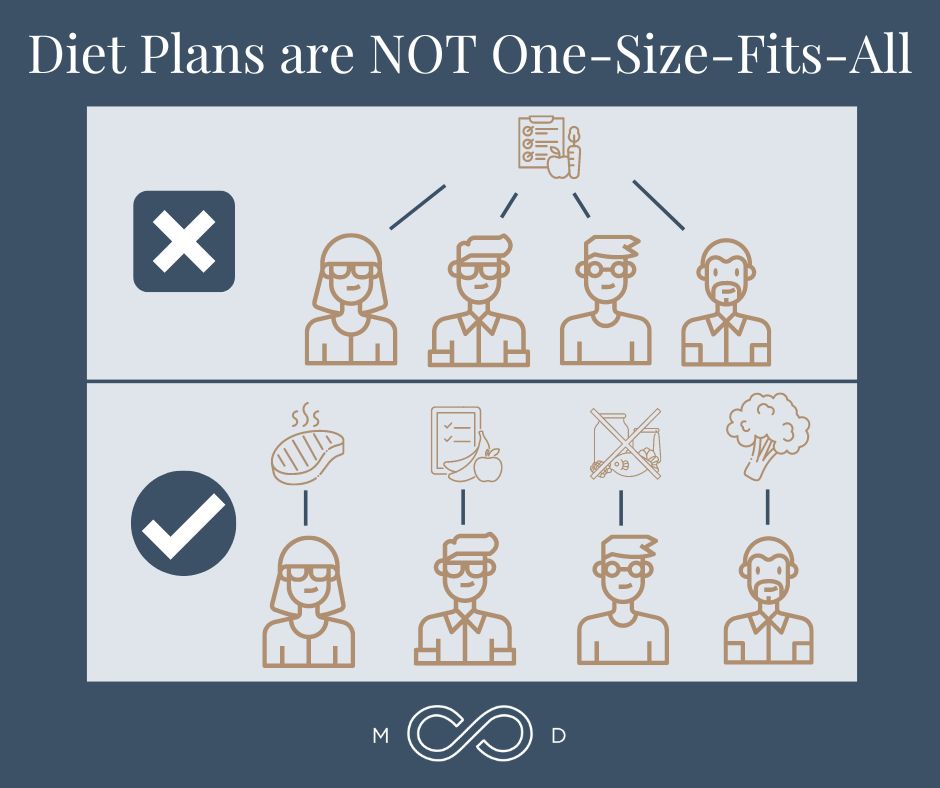When it comes to internet research, there’s one thing I always tell our members: “You know Google, but Google doesn’t know you.”
You might understand how to search online, but those search results aren’t unique to you. They’re only unique to the words you type in the search bar — and I guarantee you’re not the only person who has searched for them.
The internet has democratized information and created an era of accessibility. You’d think this would make learning and understanding easier, but in a lot of ways, all the conflicting opinions out there make finding answers more confusing. Recommendations for personalized diets and nutrition information, for example, are often incomplete and non-evidence-based, and they’re everywhere — on your social media, in your podcasts and magazines, even in your Google search results.
Typically, when you search for personalized diets, the results are linked to a certain type of outcome and promote a certain look — usually a slim body achieved through weight loss. These sources try to tug on your heartstrings and get you to associate this kind of appearance with a positive mental state.
That said, not all of these generic diet plans are inherently wrong. They’re just not necessarily right, either. When members come to me with a diet plan they’ve found, I always try to honor their ideas and look at possible strategies through an honest, objective lens.
There’s so much we still have to learn about the body’s relationship to food. But here’s what we know to be true.
The Foundational Principles of Diet and Nutrition
We often conflate our perception of diet and nutrition with weight and the stigmas we have around weight. But in my practice, I separate the terms. Diet too often connotes weight loss achieved through a strict plan. So while truly personalized diets can be helpful, I like to remove that negative connotation by focusing instead on the term nutrition.
Our nutritional choices matter. They influence how we feel mentally and physically, how we manage stress, how we sleep — I could go on. We need to acknowledge that and craft nutritional plans that encourage us to feel our best and experience life to the fullest.
And those plans don’t come directly from the internet.
Why Doesn’t General Diet Advice Work?
The diet plans and trends you may find online are typically straightforward: “Only eat between these times of the day.” “Cut out this food group.” “Count your macros.”
The thing is, these diet plans likely won’t work if you incorporate them as-is, because they aren’t designed for you specifically. They’re designed for everyone — they’re one-size-fits-all plans, so to speak. Why doesn’t one-size-fits-all advice work? Because we’re not all the same size.
I don’t use the word “size” in a body composition sense here. I’m speaking more to the fact that everyone is inherently different. In terms of a strict dietary plan, there’s no magic bullet that will work for everyone.
This is especially important to keep in mind as you take in information online. The plans you see are not your only options and don’t need to be adopted at face value if they aren’t a good fit for you.
At Brentwood MD, our personalized approach to medicine enables us to recommend nutritional plans based on each member’s unique circumstance. I’ve made a variety of recommendations to my patients based on their schedules, interests, body compositions, and family histories.
We know there isn’t one approach that fits everyone, so we don’t pretend one exists for the sake of efficiency in care.
How Should We Get Reliable Nutritional Information?
Most people come to me after an internet search and say, “You probably hate that I Googled this, but…” I always immediately tell them I’m glad they’re invested and interested in their health.
Again, I’m not saying everything on the internet is wrong. Case in point: You’re consuming this article through an internet blog! But there’s a difference between public health and personal health. The information on the internet is built for public consumption.
At some point, you’ll need a guide to help refine the information you’ve found online and tailor it to your specific health needs. Your ideal nutritional plan or personalized diet will be based on a number of factors that many standard diets don’t allocate for, such as your personal history and exercise level. Therefore, it’s best to rely on a health care provider who understands you deeply and can advise you on your routine.
Speak to a Health Care Provider About Reliable Nutritional Information
The last thing any of us want is to waste our time and effort doing something we think will benefit us, but that actually causes us harm. It’s invaluable to have someone who can help you create eating patterns that enhance your life rather than damage it. If you speak to a health care provider you trust, you’ll get straight from point A to point B and eliminate the noise that might distract you from your best options.
Ultimately, when you run across new health information online masquerading as reliable nutritional information, take it into consideration, but be cautious about how you implement it. Run your inquiries by your doctor so you can make the best choices for your personal health journey.

Dr. Wright joined Brentwood MD in 2022 as the model allows him to spend more time connecting with patients and build a foundation of exceptional care. He is a Nashville native and completed his family medicine residency at the University of Tennessee Health Science Center, where he also served as Chief Resident. He believes that your health deserves a prominent position on your priority list, and would be honored to serve you and your family.







